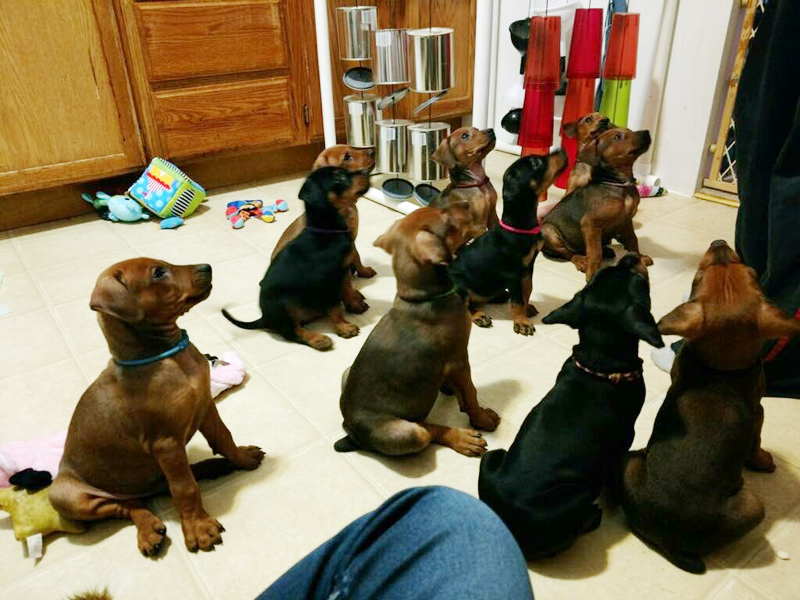How we raise our puppies
Did you know that by 8 weeks of age, 1/2 to 2/3rds of the opportunity for low-risk, positive development is already over? As breeders, we have our puppies during the majority of their critical socialization period, the time when puppies are most able to benefit from exposure to a wide range of stimuli. We have implemented a science and research-based early learning program to give our puppies their best start. Our program is very labor intensive. We devote hours and hours of time and love to the socialization and training of our puppies. We have become Avidog Associate Breeders to bring both tried-and-true and cutting-edge scientifically-sound methods to our development program to produce healthy and stable puppies. We are now also including the socialization program developed for Guide Dogs (UK), which is the only socialization program tailored to the developmental stages of puppies from birth to six weeks to demonstrate measurable, long-term positive effects on the behavioral traits of dogs. We also include elements of the Puppy Culture program with our puppies to help bring out the best of their genetic potential.
Past Puppies Current Litter Literature Review
Program Components
Nutrition
Omega 3 supplementation for optimal brain development and probiotic supplementation for a strengthened immune system. Additionally, providing excellent nutrition for our mothers while they are pregnant can positively impact puppy trainability, vision, immune systems, and lifetime cancer rates.
Epigenetics
A dam’s nutrition, stress, and levels of enrichment she receives while pregnant has been proven to have lifelong effects on her puppies. Providing positive enrichment, activity, grooming, and touching will produce puppies that will handle stress better. Maternal stess is linked to offspring that are more likely to be hyperactive, respond to stress poorly, have abnormally high blood glucose levels, mild impairment of intellectual activity, and anxiety.
Assessments
We evaluate health, structure, temperament, and if necessary, working aptitude. We use the Avidog Puppy Evaluation Test (APET) to evaluate up to 33 temperament traits and develop a custom training plan for each puppy before they go home. Service dog prospects are individually evaluated to determine suitability for assistance work.

Puppies learning to sit politely for treats - even as a group!
Mental Development & Enrichment
- Early neurological stimulation
- Early scent introduction (including rodent scents & nosework oils)
- Sound habituation and desensitization
- Early work on positive conditioned emotional responses
- Body handling & touch conditioning
- Environmental Enrichment & habituation to novel stimuli
- Problem solving, social cognition, & scent games
- Introduction to clicker training
- Automatic sit training
- Grooming conditioning & desensitization
- Beginner house training
- Exercises for the prevention of resource guarding & seperation anxiety
- Core behaviors foundation training
- Introduction to crate training
- Body awareness work
- Aquatic conditioning
- Car training
Socialization
Our puppies are raised in our home to become accustomed to daily family life. Studies show that puppies raised in domestic environments (like a breeder’s home) are significantly less likely to show aggression to strangers and to display avoidance behavior, compared to puppies raised in a garage, kennel, barn, or other non-domestic environments. Our puppies become the focus of our life, and receive daily handling, socialization, and attention from birth. They are socialized to many different people while they are with us and are allowed to interact and play with other dogs.
Experiences during the sensitive period (from 3 to 12 weeks of age) affect puppies in powerful ways that are difficult to alter later on. Studies have shown that a lack of appropriate socialization during the sensitive period plays a large role in determining whether the dog develops behavioral problems later on. In one study, the amount of socialization prior to 12 weeks of age was found to be the measure most associated with desirable behavior in adult dogs. It is important for our puppy buyers to realize that they must have a clear schedule once they get a puppy so that they can continue to positively socialize it before 12 weeks. Once the window closes on the sensitive period, you cannot reopen it!
Early Scent Introduction
During the neonatal period, between birth and 2 weeks, a puppy's eyes and ears are sealed shut. They have very little control over their body temperature, and even need help to pee and poop. These puppies can only feel, taste, and smell. So how do we take advantage of this period of development to help improve our dogs? For decades, many breeders have already been doing Early Neurological Stimulation, but we can do even more with these puppies! That's where Early Scent Introduction comes in!
Starting on day three, we introduce each puppy to a new scent each day. We present each novel scent to the puppy for about five seconds, holding it just in front of but not touching its nose. These early scent introductions can improve scenting abilities in adult dogs, enable them to achieve more complex scent work, and to do so earlier in life. This protocol is especially appropriate for potential service dogs, detection dogs, and barn hunt and nosework competitors.
